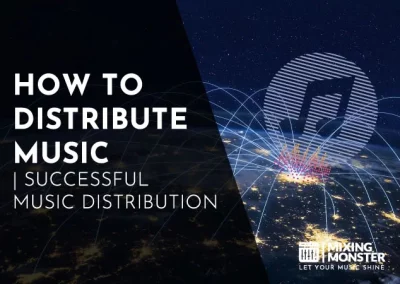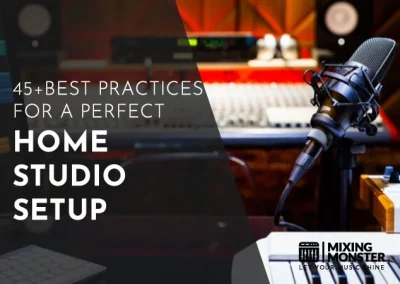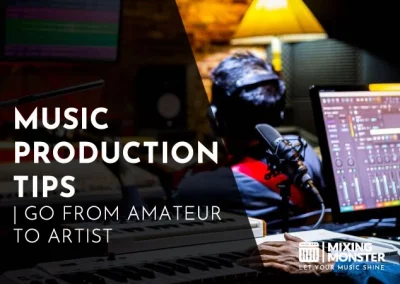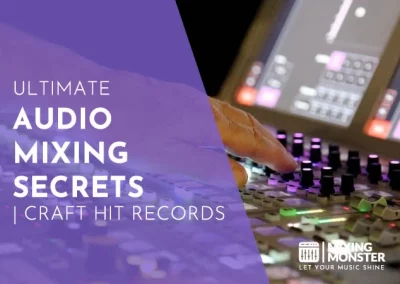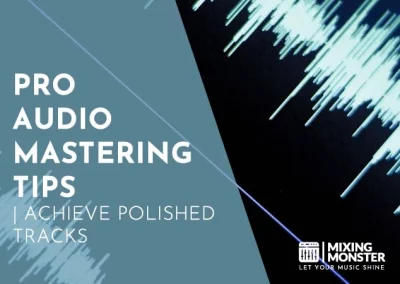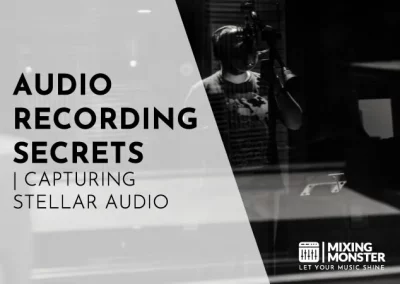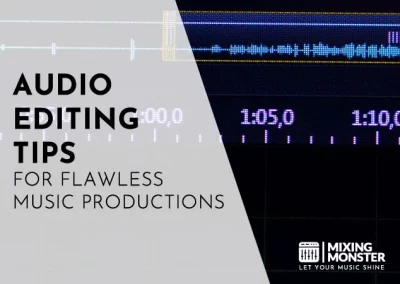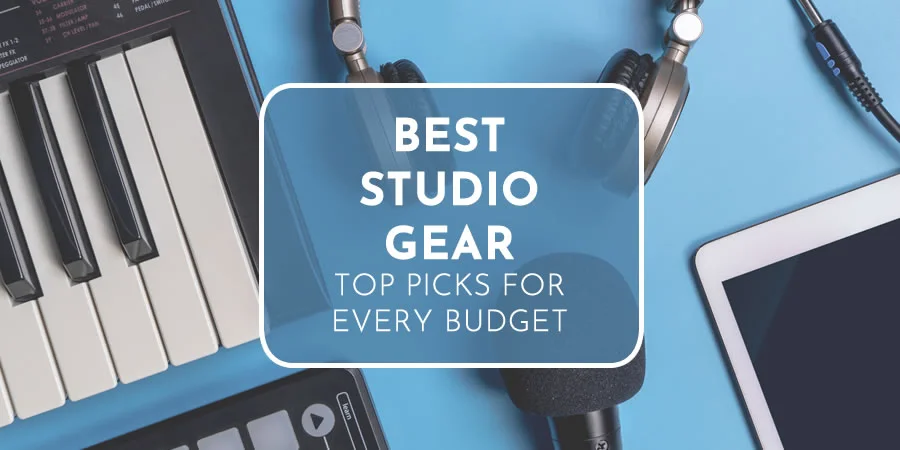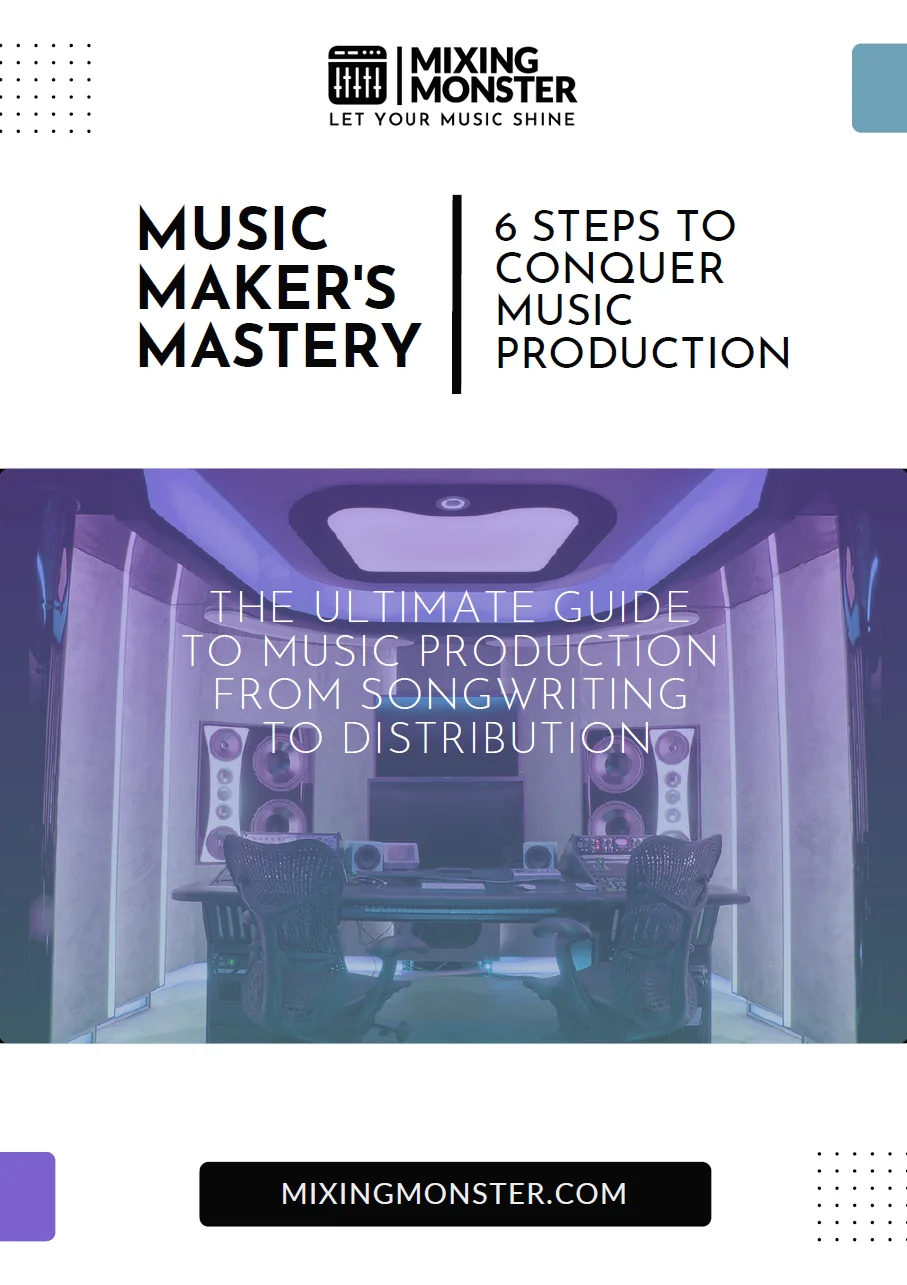Home > Blog > Music > Music Industry
Disclosure: Some of the links below are affiliate links, meaning that at no additional cost to you, we will receive a commission if you click through and make a purchase. Read our full affiliate disclosure here.
Embarking on a music production business venture marries passion with entrepreneurship, sparking a symphony of creative fulfillment and financial gain. Your journey in this dynamic industry begins with understanding the terrain and equipping yourself with the tools for success.
The music production business encompasses various activities, from the technical aspects of recording and mixing tracks to the managerial tasks of running a studio and collaborating with artists. A music production business, at its core, involves transforming artistic visions into marketable recordings. By crafting a conducive environment for artists, these businesses become pivotal in developing sonic landscapes and curating the auditory backdrop of our modern culture.
As you ponder over the melodies of your future enterprise, gear up for a thorough exploration of the music production business. We delve into crafting a solid foundation, honing your brand, selecting essential equipment, and mastering service offerings. With this knowledge, you’ll navigate the rhythm of business operations and financial strategies, learn valuable marketing techniques, and prepare for growth, anticipating the continuing evolution of the music industry.
KEY TAKEAWAYS:
- Understanding music production is crucial to business success.
- Essential equipment and services define the business’s quality.
- Effective marketing and growth strategies ensure longevity.
Table Of Contents
1. Understanding The Music Production Business
2. Developing A Strong Music Production Business Foundation
3. Building Your Music Production Brand And Online Presence
4. Acquiring Essential Music Production Equipment
5. Offering Professional Music Production Services
6. Setting Up Your Music Production Business Operations
7. Financial Strategies For Your Music Production Business
8. Targeted Marketing And Promotion Strategies
9. Planning For Growth And Staff Expansion
10. Music Production Challenges And The Future Of Music Production
11. FAQ

1. Understanding The Music Production Business
In the intricate tapestry of the music industry, understanding the business side is just as vital as mastering the musical components. Your success hinges on your grasp of evolving trends, the key players, and the target market.
Evolving Music Industry Trends
The music industry is constantly in flux, with digital technology at the helm of transformation. Streaming has overtaken traditional forms of distribution, making it essential for you to stay abreast of digital music distribution and streaming platforms.
Live music experiences and direct-to-fan sales are also picking up steam, thus diversifying revenue streams. Moreover, keep your eye on the global reach of music, which allows for cross-cultural collaborations and new market opportunities.
Key Music Industry Players And Competitors
Record labels, distribution companies, and music publishers are just the tip of the iceberg for critical players in the music business. As a music producer, your competitors may range from do-it-yourself (DIY) indie producers to major production powerhouses.
Identifying your key competitors involves a granular analysis of their market position, strengths and weaknesses, and production niche. Recognize the importance of synergistic relationships with artist management and promoters to bolster your standing.
Identifying Your Target Market In The Music Production Business
Your target market in music production is not a one-size-fits-all audience. Conduct a thorough market analysis to understand the demographics and preferences of your audience base. Are young adults drawn to indie labels or mainstream listeners loyal to established artists?
Tailor your marketing strategies to the listening platforms they frequent and their preferred music genres. Understanding your market’s consumption habits is vital in carving out your unique space in the crowded industry.
2. Developing A Strong Music Production Business Foundation
Strengthening the foundation of your music production business is vital for sustainability and growth. This involves careful planning and adherence to legal, financial, and industry-specific guidelines to set your enterprise on a path to success.
Creating A Comprehensive Music Production Business Plan
A thorough music production business plan is your roadmap. It outlines your vision, goals, and the strategies you’ll use to achieve them. Consider including:
- Executive Summary:
Capture the essence of your music production business’s nature, vision, and mission. - Market Analysis:
Understand and document the demand for music production in your target market. - Organizational Structure:
Define your business’s organization, detailing roles and responsibilities. - Marketing Plan:
Outline your strategies for attracting and retaining clients. - Operational Plan:
Describe the day-to-day operations, including the studio setup and production process. - Financial Projections:
Provide realistic economic forecasts to help gauge future performance.
Financial Planning And Music Production Business Management
Proper financial planning is critical to your business’s stability and profitability. It’s important to:
- Develop a financial plan that includes various financial statements like cash flow projections, income statements, and balance sheets.
- Maintain thorough records of your finances to monitor the health of your business and make informed decisions.
- Consider the tax implications of your business structure and stay compliant with all taxes related to your operation.
Legal Structure And Business Registration
Choosing the proper business structure is essential for tax purposes, liability protection, and personal asset security. Once decided, register your business to ensure it’s a legal entity. The main structures include:
- Sole Proprietorship
- Partnership
- Limited Liability Company (LLC)
- Corporation
Music Production Business Licensing And Permits
Licenses and permits are necessary to operate a music production business legally. Please obtain these to avoid fines or closure. Check with local and federal agencies to ensure you have what’s required. Additionally, opening a business bank account and getting business insurance should be part of your checklist to protect your business and personal assets.
3. Building Your Music Production Brand And Online Presence
Building a solid music production brand and establishing an online presence is crucial for your business’s success. This section will teach you how to create a professional website, utilize social media marketing, and develop a consistent brand identity to promote your music production services effectively.
Designing A Professional Website
Your website acts as your digital storefront and needs to be professional and functional. Prioritize clean design and easy navigation for potential clients to explore your services.
Ensure that SEO is at the heart of your site’s development to improve your visibility on search engines. Incorporate elements like your logo, a clear description of your services, samples of your work, and contact information.
Leveraging Social Media Marketing
Social media is a powerful tool for marketing and promotion. Choose platforms that align with your target audience and create content that showcases your brand’s personality.
Regular posting, engaging with your audience, and utilizing multimedia formats can enhance your online presence. Paid promotions and influencer collaborations can also be effective strategies to increase your reach.
Developing A Consistent Brand Identity
Your brand identity is more than just a logo; it represents your values and the unique benefits you offer. It’s essential that your branding is consistent across all platforms, including your website, social media, and offline marketing materials. This includes using the same color scheme, font styles, and messaging tone to forge recognition and trust with your audience.
4. Acquiring Essential Music Production Equipment
In music production, your equipment is your arsenal. Quality tools and instruments are paramount for professional audio work, enabling you to capture, create, and produce music with clarity and precision.
Selecting The Right Music Production Tools
To begin your venture into music production, focus on obtaining a reliable computer and a polished Digital Audio Workstation (DAW). These are the foundations of your digital setup.
When choosing your DAW, consider the interface, available features, and compatibility with other equipment. A robust audio interface is also critical for connecting microphones, instruments, and other hardware to your computer.
- Computer:
It should have ample processing power and memory. - DAW:
Select one that aligns with your workflow preference.
Next, microphones and studio monitors are indispensable for capturing and editing sound verifiably. A versatile large-diaphragm condenser microphone is ideal for recording vocals and acoustic instruments, while dynamic microphones may be better suited for louder sources like drums. Your studio monitors should offer flat frequency response for accurate playback.
- Microphones:
Condenser for subtlety, dynamic for power. - Studio Monitors:
Look for transparency and a flat response.
Investing In High-Quality Instruments And Hardware
Once the essentials are in place, consider the instruments and additional recording equipment that will enrich your productions. Quality matters, as high-end instruments and hardware, can elevate your sound and inspire creativity.
Invest in a MIDI keyboard for composing and programming digital instruments, and seek out top-tier synthesizers or guitars if they’re integral to your genre.
- MIDI Keyboard:
A gateway to digital composing. - Synthesizers:
Choose analog or digital based on your sound preference.
Lastly, pay attention to the ancillary equipment and supplies that aid the recording process, such as microphone stands, cables, and pop filters. High-quality cables can reduce noise interference, and well-constructed stands will ensure microphone stability.

5. Offering Professional Music Production Services
Your music production business is poised to provide professional services tailored for artists and bands at every level of their careers. Here, we delve into the core offerings of recording, mixing, and mastering. We explore how expanding services to include music lessons and artist management can diversify your studio’s portfolio and revenue streams.
Understanding Recording, Mixing, And Mastering
When you enter the realm of music production services, the cornerstone is the recording studio. It’s your primary environment where you capture the raw talent of musicianship. High-quality recording is the first crucial step towards a polished final product.
Next, mixing comes into play. This is where you balance levels, pan audio, and apply effects to create a cohesive sound from the multitrack recording. Lastly, mastering is the finishing touch that ensures the track sounds its best across all listening platforms and media formats.
- Recording:
Capturing high-quality audio with professional equipment. - Mixing:
Balancing and refining tracks for harmonic unification. - Mastering:
Standardizing audio for optimal playback quality.
Expanding Services To Include Music Lessons And Artist Management
Diversifying your business to include music lessons can attract a broader clientele and encourage repeat business. Whether you’re offering vocal coaching, instrumental training, or production workshops, you’re investing in the growth of your clients’ talents.
Furthermore, providing artist management services places you in a unique position to foster artists’ careers beyond the recording studio. This could include guiding their branding, booking gigs, and negotiating contracts on their behalf.
- Music Lessons:
Personalized training in various aspects of music. - Artist Management:
Strategic career planning and support services.
6. Setting Up Your Music Production Business Operations
In this section, you’ll discover the practical steps for launching your recording studio and implementing effective operational strategies to efficiently run your music production company.
Launching Your Recording Studio
Successful setup of a recording studio is pivotal for your music production business. Below are essential steps to get your recording studio up and running:
- Choose A Location:
Find a site conducive to sound recording, considering factors like acoustics, size, and accessibility for artists. - Design The Studio Space:
Develop an interior layout that optimizes sound quality and includes recording and control rooms. - Acquire Equipment:
Invest in high-quality recording gear, soundproofing materials, mixing consoles, microphones, monitors, and software. - Soundproofing:
Ensure your studio is acoustically treated to prevent sound leakage and create the best recording environment. - Establish Studio Time Management:
Implement a scheduling system to book and manage studio time efficiently. - Hire Skilled Personnel:
Consider hiring sound engineers, producers, and support staff with experience operating a recording studio effectively. - Compliance And Insurance:
Secure the necessary permits and insurance to safeguard your studio against business risks.
Implementing Effective Operational Strategies
Once your recording studio is operational, focus on the business side to ensure that day-to-day activities align with your strategic goals.
- Efficient Workflow:
Create a workflow strategy streamlining processes from client intake to final production delivery. - Financial Management:
Keep meticulous financial records and establish pricing that reflects the value of your services and covers operational costs. - Client Relations:
Develop a system for managing client projects, communications, and feedback to foster repeat business and referrals. - Maintenance Schedule:
Regularly maintain and upgrade equipment to avoid downtime and ensure high-quality recordings. - Marketing and Networking:
Create marketing plans highlighting your studio’s strengths and network within the industry to attract a diverse clientele.
7. Financial Strategies For Your Music Production Business
Effective financial management is crucial for the sustainability of your music production business. You’ll navigate initial investments and identify revenue models that align with industry standards, ensuring profitability and growth.
Navigating Startup Costs And Funding Opportunities
Your initial financial hurdle is comprehensively understanding your startup costs. This includes equipment, software, facility expenses, marketing, and legal fees. A detailed list will help you assess your capital requirements.
To cover these costs, explore funding opportunities such as traditional business loans, seeking investors, or utilizing online crowdfunding platforms. Each funding source has unique terms and industries it caters to, with some focusing on creative endeavors like music production.
- Equipment And Software:
Estimated costs for essential equipment and high-quality software. - Facilities:
Rent or purchase of studio space and its upkeep. - Operating Expenses:
Day-to-day expenses for running your business. - Marketing and Legal Fees:
Costs for promotion and legal compliance.
Solidify a financial plan by considering the following:
- Savings:
Personal funds set aside for business use. - Loans:
Compare interest rates and repayment terms of different lenders. - Investors:
Pitch your business to potential investors and negotiate ownership stakes. - Grants and Crowdfunding:
Look for music-specific grants or launch a crowdfunding campaign.
Establishing Pricing And Revenue Models
Determining your pricing is a balancing act between covering costs, providing value, and maintaining competitive rates. Establishing a clear pricing structure aligns with your targeted profit margin and reflects the quality of your services. Consider your target market’s budget and your competitors’ rates.
- Hourly/Daily Rates:
For recording, mixing, and mastering services. - Project-Based Pricing:
Packages for EPs, albums, or singles production. - Additional Services:
Composing, sound design, or audio branding.
Your revenue models should cater to different client needs while optimizing income streams. Consider offering membership or subscription models for repeat clients. Diversifying your services can also open additional revenue streams, such as sound libraries or educational workshops.
- Memberships:
Retainer services for clients with ongoing needs. - Subscriptions:
Access to premium content or recurring services. - Diversification:
Leveraging skills to create products like sample packs.
8. Targeted Marketing And Promotion Strategies
To elevate your music production business, you must focus on marketing and promotion strategies that directly engage your target audience. Specially tailored campaigns for local artists and structured networking could set your services apart.
Developing A Marketing Plan Targeting Local Artists And Bands
When crafting your marketing plan, specificity is your ally. Begin by identifying local artists and bands in your genre or style preference.
Create a customer persona that encompasses your ideal local clientele’s characteristics, goals, and challenges. This will guide where and how you spend your promotional efforts. Here’s a concise action list to consider:
- Research local music scenes and trends to tailor your services.
- Customize packages specifically for different types of local artists and bands.
- Engage through social media channels and music forums with content that appeals to your audience.
- Offer incentives like discounts or free trial sessions to attract and retain artists.
Remember, your goal is to make artists feel your services are designed with their needs in mind.
Networking And Collaboration Opportunities
Networking is invaluable; it opens doors to collaboration and referral opportunities. To get started, attend local music events and showcases—where potential clients gather. Consider these targeted strategies:
- Join local music associations or groups to increase visibility.
- Host or sponsor local music events to show your support for the community.
- Collaborate with music schools, offering seminars or workshops.
- Create exchange deals with other local businesses targeting artists, like instrument shops or recording studios.
You broaden your reach through these channels and are seen as a credible pillar in the local music industry. Your efforts should strive to create a network that benefits all parties involved.
9. Planning For Growth And Staff Expansion
Expanding your music production company requires deliberate planning and strategic hiring. Focusing on attracting talent and investing in their development will empower you to meet your business goals and thrive in a competitive industry.
Hiring Skilled Music Production Professionals And Industry Experts
When looking to expand your team, prioritize candidates with a proven track record in music production. Your management team should look for the following:
- Experience:
Seek individuals involved in successful projects who can demonstrate their contributions. - Expertise:
Look for specialists in areas like sound engineering or seasoned session musicians who can elevate your company’s offerings. - Industry Professional:
Onboard industry professionals with the technical skills and a network that can open doors for new opportunities.
Consider creating a table to organize your hiring strategy:
| Role | Skills Required | Experience Level |
|---|---|---|
| Sound Engineer | Audio mixing, mastering | 5+ years |
| Session Musician | Multi-instrumentalist | Touring experience |
| Management Team Member | Leadership, network, industry knowledge | 10+ years |
Training And Development For Your Team
Investing in the continuous training and development of your team is crucial. Here’s how you can approach it:
- Set Clear Goals:
Define what training success is specific to each role and measure progress against these goals. - Customized Training Programs:
Develop tailored programs for sound engineering excellence or industry-specific skills. - Regular Workshops:
Host workshops with industry experts to update your team on the latest trends and techniques.
10. Music Production Challenges And The Future Of Music Production
In this pivotal time, your focus on evolving consumer preferences and continuous technological innovation will determine your success in the music production industry.
Addressing Market Shifts And Consumer Demands
You must stay attuned to the dynamic nature of music consumption as digital platforms and services redefine the landscape.
As a music producer, these shifts demand that you strategically embrace digital audio workstations and other sophisticated audio production tools to match the quality and accessibility that listeners expect. Tailoring music production to these emerging patterns isn’t just beneficial; it’s essential for survival in the industry.
Innovating With Technological Advancements
Technological progress is profoundly shaping the music production business. The introduction of AI in music composition and the increasing capabilities of digital audio workstations stand out as significant industry trends.
Integrating these advancements into your workflow would be best to stay competitive. By doing so, you can overcome challenges related to efficiency, creativity, and personalization of music production.
Key Takeaways For Music Production Entrepreneurs
- Your adaptability to market shifts will enable you to meet evolving consumer demands in music consumption.
- Technological innovations, like AI and advanced digital audio workstations, offer opportunities to enhance the creativity and efficiency of your music production.
- By innovating responsibly and staying informed, you can overcome current challenges and position yourself at the forefront of the music production industry’s future.
11. FAQ
1) What are the essential steps to starting a music production business?
To launch your music production business, conduct market research and secure funding. You must also structure your business as a legal entity and obtain the necessary licenses. More detailed steps can be found in a guide on starting a music production company.
2) How does one create a successful business plan for a music production company?
A successful business plan clearly describes your company’s goals and the services you provide. It also identifies your target market and outlines strategies for growth. Writing a comprehensive plan begins with understanding the purpose of your music production business, as detailed on Newfound.
3) What are the key differences between a music production company and a record label?
A music production company focuses on the creative process of recording and producing music, while a record label primarily distributes, markets, and promotes music recordings. Both play distinct roles in the music industry’s ecosystem.
4) What are some effective strategies for generating revenue in the music production industry?
Diversify your services to include recording, mixing, mastering, and offering educational services. Developing strong industry connections and embracing digital distribution can open additional revenue streams.
5) How can an individual establish a unique brand for their music production business?
Identify your niche and craft a consistent message that resonates with your target audience. Create a strong visual identity and maintain a professional online presence. Personalize your approach and showcase your unique production style to stand out.
6) What are the legal considerations when setting up a music production business?
Ensure compliance with local business regulations and copyright laws. Also, obtain the correct agreements and contracts to protect your work and your company’s integrity. Selecting the appropriate business structure is fundamental, as illustrated by Recording Connection.



